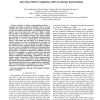Free Online Productivity Tools
i2Speak
i2Symbol
i2OCR
iTex2Img
iWeb2Print
iWeb2Shot
i2Type
iPdf2Split
iPdf2Merge
i2Bopomofo
i2Arabic
i2Style
i2Image
i2PDF
iLatex2Rtf
Sci2ools
103
click to vote
ICDM
2010
IEEE
2010
IEEE
One-Class Matrix Completion with Low-Density Factorizations
Consider a typical recommendation problem. A company has historical records of products sold to a large customer base. These records may be compactly represented as a sparse customer-times-product "who-bought-what" binary matrix. Given this matrix, the goal is to build a model that provides recommendations for which products should be sold next to the existing customer base. Such problems may naturally be formulated as collaborative filtering tasks. However, this is a one-class setting, that is, the only known entries in the matrix are one-valued. If a customer has not bought a product yet, it does not imply that the customer has a low propensity to potentially be interested in that product. In the absence of entries explicitly labeled as negative examples, one may resort to considering unobserved customer-product pairs as either missing data or as surrogate negative instances. In this paper, we propose an approach to explicitly deal with this kind of ambiguity by instead tre...
| Added | 12 Feb 2011 |
| Updated | 12 Feb 2011 |
| Type | Journal |
| Year | 2010 |
| Where | ICDM |
| Authors | Vikas Sindhwani, Serhat Selcuk Bucak, Jianying Hu, Aleksandra Mojsilovic |
Comments (0)

